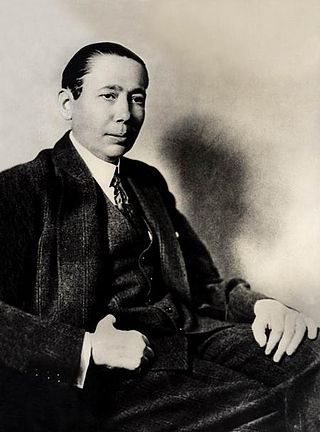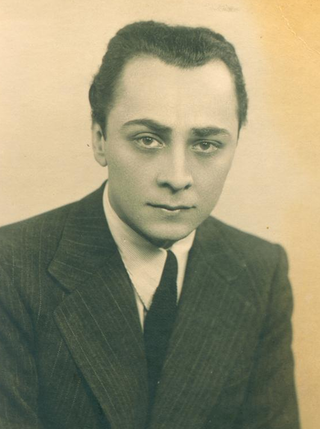Related Research Articles

Nicolae Titulescu was a Romanian politician and diplomat, at various times ambassador, finance minister, and foreign minister, and for two terms president of the General Assembly of the League of Nations (1930–32).

Gheorghe I. Tătărescu was a Romanian politician who served twice as Prime Minister of Romania, three times as Minister of Foreign Affairs and once as Minister of War (1934). Representing the "young liberals" faction inside the National Liberal Party (PNL), Tătărescu began his political career as a collaborator of Ion G. Duca, becoming noted for his anticommunism and, in time, for his conflicts with the PNL's leader Dinu Brătianu and the Foreign Minister Nicolae Titulescu. During his first time in office, he moved closer to King Carol II and led an ambivalent policy toward the fascist Iron Guard and ultimately becoming instrumental in establishing the authoritarian and corporatist regime around the National Renaissance Front. In 1940, he accepted the cession of Bessarabia and Northern Bukovina to the Soviet Union and had to resign.

Nicolae Petrescu-Comnen was a Romanian diplomat, politician and social scientist, who served as Minister of Foreign Affairs in the Miron Cristea cabinet. He debuted in France as a public lecturer and author of several books on political history, then returned to Romania as a judge and member of the University of Bucharest faculty. Comnen spent most of World War I in Switzerland, earning respect at home and abroad for his arguments in favor of nationalism, his publicizing of the Greater Romanian cause, and especially for his support of the Romanian community in Dobruja. During the Paris Peace Conference, he was dispatched to Hungary, proposing political settlements that would have made the Treaty of Trianon more palatable to Hungarian conservatives. Also noted as an eccentric who published poetry, he was often ridiculed for his claim to a Byzantine aristocratic descent from the Komnenos.

Gheorghe (George) I. Brătianu was a Romanian politician and historian. A member of the Brătianu family and initially affiliated with the National Liberal Party, he broke away from the movement to create and lead the National Liberal Party-Brătianu. A history professor at the universities of Iași and Bucharest, he was elected titular member of the Romanian Academy. Arrested by the Communist authorities in 1950, he died at the notorious Sighet Prison.

Nicolae L. Lupu was a Romanian left-wing politician and social physician. Originally a leader of the Labor Party, which was joined with the Peasants' Party, Lupu served as Interior Minister in 1919–1920. He formed his own Peasants' Party–Lupu in 1927, and also steered the creation of a League Against Usury; the party dissolved in 1934. His group became a dissident faction of the National Peasants' Party, and was reestablished, after World War II, as the Democratic Peasants' Party–Lupu.

Eugen Filotti was a Romanian diplomat, journalist and writer. As a diplomat he worked at the League of Nations in Geneva and then as minister plenipotentiary in Turkey, Greece, Bulgaria, and Hungary. As minister plenipotentiary to Budapest he issued transit visas for Jews during the Holocaust. He was secretary general of the Ministry of Foreign Affairs in 1944–1945. As writer he published several translations of literary works.

Nicolae Titulescu is a commune in Olt County, Muntenia, Romania. It is composed of a single village, Nicolae Titulescu. It also included Ghimpețeni and Ghimpețenii Noi villages until 2004, when they were split off to form Ghimpețeni Commune.

Savel Rădulescu was a Romanian diplomat. He started his career in 1921 and worked as secretary of Nicolae Titulescu at the League of Nations. For his diplomatic activity he was distinguished with the Order of Malta.
Victor V. Bădulescu was a Romanian economist, lawyer, and diplomat who was elected as a corresponding member of the Romanian Academy.
Nicolae Lahovary, 1887-1972, was a Romanian diplomat. He was minister plenipotentiary to Albania (1934–1936) and to Switzerland from 1940-1944 before being replaced by Vespasian Pella. In his capacity of envoy to Switzerland he was active in contacts with the representatives of the allies for ensuring an armistice. After he was recalled in 1944, he settled in Switzerland, where he was an active member of the Romanian exile.
Dimitrie Drăghicescu was a Romanian politician, sociologist, diplomat and writer.
Vasile Grigorcea was a Romanian diplomat. His main assignments were minister plenipotentiary of Romania to Hungary, Poland, United Kingdom and the Vatican.

Dimitrie I. Ghika or Ghica was a Romanian politician and diplomat. He was the son of Ioan Grigore Ghica, former minister of National Defence and of Foreign Affairs.
Henric Ștefan Streitman was a Romanian journalist, translator and political figure, who traversed the political spectrum from socialism to the far-right. A physicist, social commentator and publisher, in his early years he was a promoter of natural selection ideas as well as a translator of Marxist and naturalist literature. Respected for both his polemical stances and his erudition, he was also rendered controversial by his inconsistencies and his alleged corruption. Often struggling financially, Streitman set up several short-lived periodicals, and involved himself in the cultural and political debates, from 1889 to the time of his death.

Grigore N. Filipescu was a Romanian politician, journalist and engineer, the chief editor of Epoca daily between 1918 and 1938. He was the scion of an aristocratic conservative family, son of the statesman Nicolae Filipescu and a collateral descendant of Alexandru II Ghica. During the early stages of World War I, he and his father led a pro-Allied dissident wing of the Conservative Party. After serving on the front, and behind the lines to 1918, as aide to General Alexandru Averescu, Filipescu Jr. became his political adviser. He had a stint in the Labor Party, merged into Averescu's own People's Party. Filipescu served as the latter group's tactician and campaigner, but had irreconcilable differences with Averescu.

Leon or Levon Kalustian, also known as Calustian, was a Romanian journalist, essayist and memoirist. An Armenian on his father's side, he abandoned his studies to work in the interwar press, taking editorial positions at Cuvântul, Curentul, and finally Mișcarea. As a left-winger who ultimately joined the Social Democratic Party, he took a side in public controversies, defending the political line espoused by Nicolae Titulescu and attacking Stelian Popescu. Kalustian was allegedly a collaborator of Siguranța secret policemen, and remained close to the disgraced spy chief, Eugen Cristescu. While retiring from political journalism with the advent of a dictatorial regime, under the National Renaissance Front, he accepted various commissions from the Front, and was employed by its official newspaper România.

The cabinet of Constantin Angelescu was the government of Romania from 30 December 1933 to 3 January 1934.

The first cabinet of Gheorghe Tătărăscu was the government of Romania from 5 January to 1 October 1934.

The second cabinet of Gheorghe Tătărăscu was the government of Romania from 2 October 1934 to 28 August 1936.

Nicolae Samsonovici was a Romanian general. He attended officer training school in Bucharest from 1897 and afterwards joined an infantry regiment in a Romanian Army regiment. Samsonovici commanded a battalion during the Second Balkan War and during the First World War served was chief of staff of, successively, a division, corps and army. He ended the war in command of the 77th Infantry Regiment. Samsonovici was promoted to general rank in 1919 and served on the army staff; in the 1930s, he served as Chief of the General Staff and as Defense Minister. He resigned from active duty in 1937 upon which he was promoted to the rank of army corps general. Samsonovici was arrested by the communist regime in 1950 and died in prison.
References
- Alexandru-Murad Mironov 1934. – Deschiderea de legaţii la București şi Moscova
- George G. Potra – Reacţii necunoscute la demiterea lui Titulescu – 29 August 1936: O "mazilire perfida"